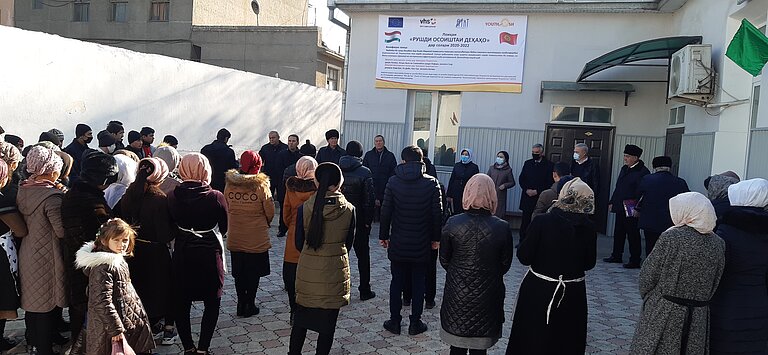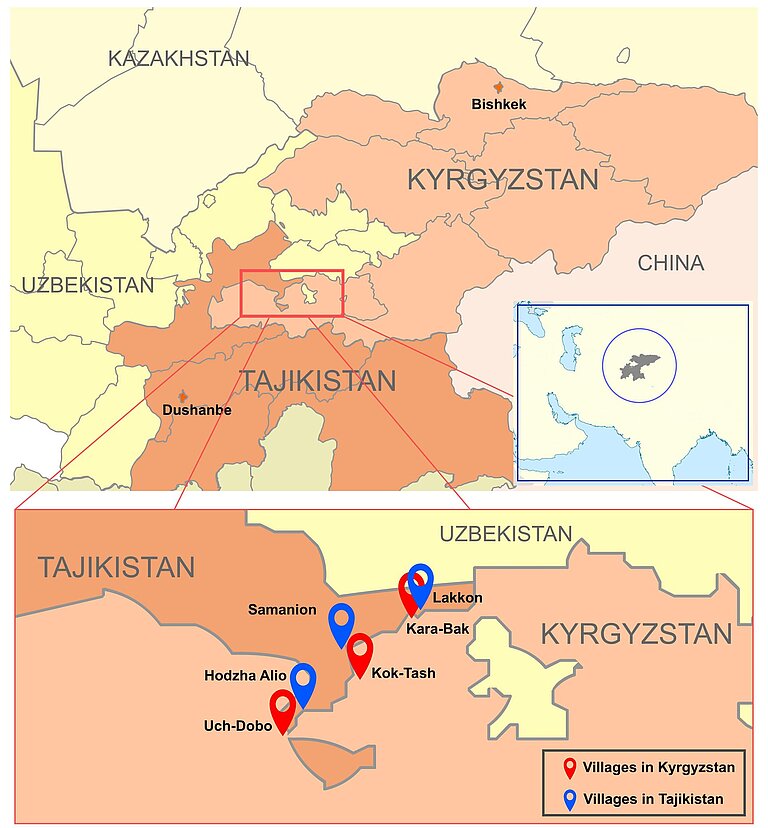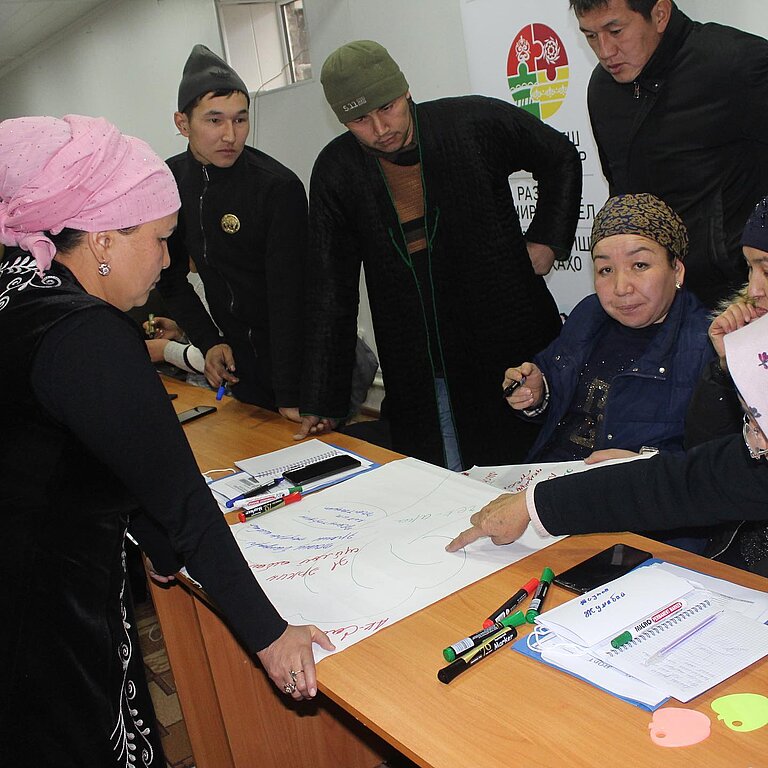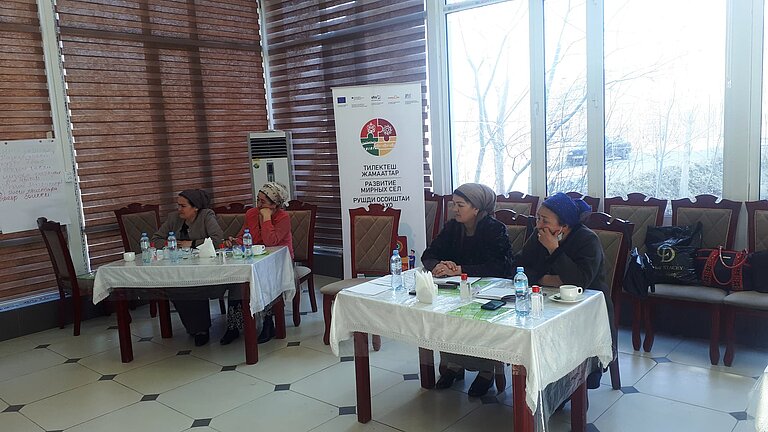The role of women in peace-building between Kyrgyzstan and Tajikistan

Since March 2020, DVV International in Central Asia has been implementing a cross-border project in 6 villages on the Kyrgyz-Tajik border with the main objective of contributing to peaceful relations and prevention of violent conflict in a region which has seen latent and open conflict, including clashes at the end of April 2021.
About the conflict
The first incidents of cross-border conflict between the then Soviet Republics of Kyrgyzstan and Tajikistan happened in the 1970s and 1980s. At that time the Soviet authorities suppressed the riots with military force. After the collapse of the Soviet Union and Kyrgyzstan’s and Tajikistan’s independence, the situation on the border deteriorated and open violent conflict has broken out repeatedly. The root cause for this is that the border that now separates two independent nation states does not follow any clear-cut lines, and large parts have not been fully delimitated up to now. Villages belonging to the one country are sometimes surrounded by the territory of the other, thus forming enclaves, or cut into halves by the international border.
Open hostilities during the post-Soviet period have usually centred around water resources, land use, or the construction or alteration of roads, fences, and walls. While previous violence along the border was always localized, involving several villages on opposite sides of the frontier, the recent armed clashes were the first incidents – since the five Central Asian states became independent in late 1991 – in which the militaries of two countries in the region engaged in combat against each other. The fighting was over relatively quickly, however it led to a number of casualties, mostly civilians.
Peaceful Villages Evolvement Project
DVV International’s ongoing project, financed by the EU and the Federal Ministry for Economic Cooperation and Development (BMZ), is designed to enhance peaceful cross-border relations between Kyrgyzstan and Tajikistan and to foster cross-border and regional cooperation, thus mitigating the threats to sustained peace in Central Asia. In total, 2,300 border residents of three villages in the Batken Region of Kyrgyzstan, with their counterparts across the border in three neighbouring villages of Isfara District of Tajikistan, will be involved in the project action as direct target groups. The project puts emphasis on the particular roles of traditional leaders, young people and women by planning special programmes and activities for these target groups.
Despite the pandemic and the limitations caused by the conflict, the project is concluding its first year of implementation. A variety of educational, dialogue, and community mobilisation activities have significantly contributed to fighting stereotypes, and to supporting tolerance, open-mindedness and a culture of constructive communication among border residents. The project also contributes to building a strong basis for further sustainable and viable actions towards social-economic development, non-conflict and non-violent coexistence by building and equipping two community learning centres (CLCs).
Empowering women to become agents of community development and peace
According to UN statistics, when women participate in peace-making processes, the resulting agreement is 35% more likely to last 15 years. The role of women in decision-making processes is underestimated and gender stereotypes still influence actors and actions on the ground, especially in rural areas. Furthermore, when men are frequently absent due to labour migration, as it is the case in Kyrgyzstan’s and Tajikistan’s rural areas, women are simply obliged to participate in decision-making and peace-building processes and contribute to stability in their localities and region. That is why DVV International is paying special attention to women’s roles in the Peaceful Villages Evolvement Project.
One of the targeted activities in this regard was the Peace Academy for female leaders from both Isfara and Batken Districts, aimed at empowering women to have an active role in preventing violent extremism. As a result, participants increased their awareness on risk factors, and on approaches of peacebuilding and mediation. Participants demonstrated conflict sensitivity, became aware of the nature of violent conflicts in their community and those of their counterparts across the border, and learnt about methods and approaches of fostering sustainable community dialogue. They got skilled in developing, outlining and presenting their own ideas for local initiatives/projects including towards mitigating conflict locally, and overcoming gender stereotypes related to leadership.
Supporting local businesses to enhance economic development and cooperation
A business component to improve the economic perspectives of border residents is to be implemented in the upcoming project year. It will include educational activities and a small grants programme for entrepreneurs, with a focus on young people and women. Support will be rendered to local SMEs to start or further develop their businesses if they meet two basic criteria:
- It aims at creating an enabling, cooperative environment between Tajik and Kyrgyz people;
- It is led either by young people or by women.
From the two CLCs, the selected businesses will receive guidance and technical assistance towards and after the successful launch or continuation of the business ideas that they have developed.
Recent events have demonstrated once again the need to engage with the border communities to enhance their resilience to hate speech, provocations and radicalization, all of which can lead to violent conflict. The Peaceful Villages Evolvement project team, together with local stakeholders, will continue their efforts to create alternatives to violence by providing conflict transformation skills, fostering closer ties within communities, as well as encouraging tolerance towards their neighbours.
Our partner NGOs
The Kyrgyz NGO Youth of Osh (www.youthofosh.kg) is a non-profit organisation that provides education for the youth and the young adults in rural areas.
The Tajik Adult Education Association – AEAT (www.aeat.tj) is a network of education providers lobbying for adult education and strengthening the capacities of its members, for example in the field of monitoring the achievement of SDG 4.






